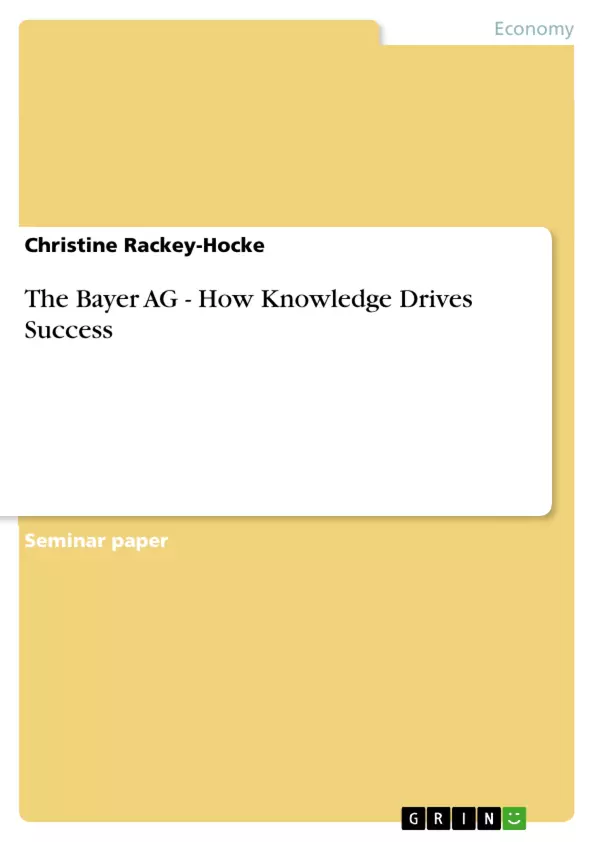Every day we are faced with an increasing amount of information and it is becoming more and more difficult to find the really important parts.
And all this in a time in which decisions must be made more rapidly than ever before.
Nowadays, knowledge is the most important productive factor by representing the real dif-ferentiation potential for people and companies – knowledge is a matter of survival.
Therefore, Knowledge Management (KM in short) is a discipline used to systematically lever-age expertise and information to improve organizational efficiency, responsiveness, compe-tency and innovation.
KM normally provides a framework, tools and techniques to reuse captured intellectual as-sets – because the key enterprise resources of a company are people and information.
Therefore, this report will introduce you to the management of information and knowledge at the Bayer AG, one of the world’s largest health care and chemicals group.
Inhaltsverzeichnis (Table of Contents)
- I. Introduction
- II. Presentation of the Bayer AG
- a) History
- b) Bayer Today
- III. Knowledge Transfer and the tools used at Bayer
- a) Stimulation of the employees
- b) Bayer's Communication Center
- IV. Network of external partnerships and alliances to optimize KM
- a) USU AG
- b) LION bioscience AG and Trips, Inc.
- c) Syntrek, Inc.
- V. Conclusion
Zielsetzung und Themenschwerpunkte (Objectives and Key Themes)
This report explores the implementation of Knowledge Management (KM) within the Bayer AG, a leading healthcare and chemicals group. The aim is to showcase how Bayer leverages knowledge as a key factor in driving success, particularly in the context of a rapidly changing global market. It emphasizes the importance of knowledge as a vital asset for both individual career development and organizational efficiency.
- Knowledge management as a strategic tool for enhancing organizational efficiency, responsiveness, competency, and innovation.
- The role of knowledge transfer in facilitating growth and competitiveness in a dynamic business environment.
- The utilization of internal and external resources to foster knowledge sharing and collaboration within the Bayer AG.
- The significance of employee engagement and development in the successful implementation of KM strategies.
- The interplay between explicit and tacit knowledge in organizational learning and decision-making.
Zusammenfassung der Kapitel (Chapter Summaries)
The report begins by introducing the concept of KM and its relevance in today's information-driven world. Chapter II provides an overview of the Bayer AG, tracing its historical development and outlining its current structure and key business segments. Chapter III delves into the company's approach to knowledge transfer, highlighting its internal initiatives such as employee training programs and job rotation schemes. It also explores Bayer's communication center, designed to facilitate knowledge sharing and collaboration.
Schlüsselwörter (Keywords)
The key themes and concepts explored in this report include Knowledge Management, Bayer AG, organizational efficiency, knowledge transfer, employee development, tacit knowledge, explicit knowledge, communication, collaboration, partnerships, and strategic alliances.
Frequently Asked Questions
What is Knowledge Management (KM) at Bayer AG?
Knowledge Management at Bayer is a systematic discipline used to leverage expertise and information to improve organizational efficiency, innovation, and responsiveness.
Why is knowledge considered a "matter of survival" for companies?
In a time of rapid decision-making and vast information, knowledge is the most important productive factor that provides differentiation potential and competitive advantages.
What tools does Bayer AG use for knowledge transfer?
Bayer utilizes internal initiatives like training programs, job rotation, and a dedicated Communication Center to facilitate sharing and collaboration.
Does Bayer work with external partners for Knowledge Management?
Yes, Bayer optimizes its KM through a network of external alliances and partnerships with companies like USU AG, LION bioscience AG, and Syntrek, Inc.
What is the difference between explicit and tacit knowledge?
The report explores how explicit knowledge (documented information) and tacit knowledge (personal experience/expertise) interact in organizational learning.
What are the key business segments of Bayer AG mentioned?
Bayer AG is described as one of the world's largest groups in the health care and chemicals sectors.
- Quote paper
- Christine Rackey-Hocke (Author), 2001, The Bayer AG - How Knowledge Drives Success, Munich, GRIN Verlag, https://www.grin.com/document/191720



